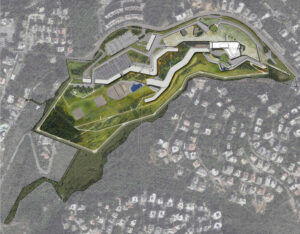The Land of Plenty: A New Chapter in U.S. Foreign Policy with Lebanon

As the diplomatic landscape shifts in the Middle East, the United States is set to make a bold statement with the construction of a new mega embassy in Lebanon, known as "The Land of Plenty." This 19-building, 43-acre compound is expected to be the largest U.S. embassy in the world, dwarfing even the White House and Nine Elms in London. With a price tag estimated at $1.2 billion, one must question the motivations behind such an extravagant investment in a country that faces immense challenges.
A Strategic Location with Significant Implications
Located just 10 miles from the heart of Beirut and a mere 60 miles from Israel, the Awkar site underscores a keen focus on regional geopolitics. Officially, the State Department emphasizes that the primary purpose of the embassy is to assist the 86,000 U.S. citizens residing in Lebanon. However, the larger narrative points toward a strategic commitment to safeguarding both American and Israeli interests amid an increasingly volatile Middle Eastern landscape.
What does this mean for investors and economic enthusiasts? The construction creates immediate job opportunities and injects capital into the local economy, though critics argue that it could also further entrench U.S. interests in a region fraught with instability.
Bipartisan Support: A Legacy of Protection
Interestingly, this endeavor has seen bipartisan support. Initial approval for the construction came during the Obama administration, with ground-breaking taking place in 2017 under Trump. Ambassador Elizabeth Richard noted, “Breaking ground today on our New Embassy Compound is a strong message to the Lebanese people that we are with you for the long term.” However, critics question whether such a substantial investment would be made if the U.S. weren’t deeply committed to its ally, Israel.
More than Just an Embassy: A Complex Security Apparatus
The facilities themselves are far from conventional. The embassy will feature not just consulate buildings and offices, but also residential units and entertainment venues. Craig Murray, a former British Ambassador, aptly remarked that this “is not an embassy, but something 50 times bigger,” reinforcing the notion that this structure serves more as a fortified compound than a diplomatic facility.
Once completed, "The Land of Plenty" may serve as a critical operational hub for intelligence activities in the region, fostering increased surveillance over neighbors like Syria and Iran, which have historically had tense relations with the U.S. and Israel.
Espionage: The Open Secret of Modern Diplomacy
Adding to the intrigue, whistleblower Edward Snowden remarked in his book, Permanent Record, that “the primary function of an embassy nowadays is to serve as a platform for espionage.” Given the strategic imperative behind the U.S. embassy in Lebanon, the truth behind its operations may be far more complex than providing consular services.
Conclusion: Implications for the Future
In this historically rich and complex landscape, the establishment of "The Land of Plenty" is poised to serve not only as a symbol of U.S. commitment in Lebanon but also as a tangible representation of geopolitics in action. As the economy in Lebanon faces crisis, the timing of this investment reveals the layered implications of U.S. foreign policy.
At Extreme Investor Network, we will continue to monitor the economic ramifications of this diplomatic venture and explore opportunities that may arise as a result. With partnerships and investments becoming increasingly global, staying informed will empower you to make strategic decisions that align with evolving trends.
Stay tuned as we unpack more about this and other vital issues shaping our world today. Your engagement with us is more than just about information — it’s about investing in a well-informed future.

